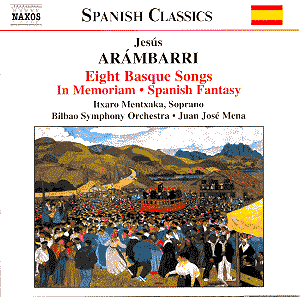Though he may be better known as a conductor, Arámbarri
was also a distinguished composer of no mean achievement. The present
collection certainly bears that out. The works are recorded here
by the Bilbao Symphony Orchestra which the composer conducted for
several years. Incidentally, this orchestra, founded in 1922, gave
its first concert under the baton of the Belgian composer Armand
Marsick.
Arámbarri began his musical studies in
his home town before travelling to Paris. There he studied composition
with Paul Dukas, who had also been Rodrigo’s teacher, and conducting
with Vladimir Golschmann who was also conductor of the Bilbao
Symphony Orchestra. Later still, he studied further with Felix
Weingartner in Basle. Most of the pieces here date from the 1930s.
After his return to Spain, he devoted most of his time to conducting
though he nevertheless managed to compose some further pieces
such as Ofrenda in 1946 and the zarzuela Viento
sur in 1952. Most pieces make lavish use of Basque folksongs
such as the colourful prelude Gabon-zar sorgiñak
("Witches on New Year’s Eve") that opens this
disc. This short work falls into three inter-linked sections (three
tracks are indexed, but we are not told what they are), a rather
serious introduction followed by a slower section and a lively
Finale. Cuatro impromptus is a set of four short
orchestral studies, with some folk-like inflections, superbly
crafted and quite attractive. Ocho canciones vascas
("Eight Basque songs") is the real gem in this worthwhile
selection of Arámbarri’s music. These simple arrangements
are superbly done, clothed with a remarkably subtle orchestration,
full of lovely instrumental touches. By turns dreamy, sad, gentle,
tender and humorous (the final song is particularly funny), these
settings often recall de Falla and Canteloube, whose beautiful
Chants d’Auvergne often come to mind. Canteloube
has also composed a set of Chants basques. Actually,
one of the Basque songs bears some marked melodic resemblance
to one of Canteloube’s songs. (They are sung in Basque but neither
text nor translation is included.) In memoriam,
subtitled Elegy for orchestra, was composed in 1939 in
memory of the Basque writer Juan Carlos de Gortázar and
includes quotes from Guridi’s beautiful choral work for treble
voices and orchestra Así cantan los chicos
(now available on a recent Naxos disc [8.557110]) setting works
by Gortázar and from the Dies Irae. This moving
and deeply-felt elegy opens on the basses’ softly tolling gesture
supporting a sad descending theme (this is a really marvellous
moment). The music builds towards an impassioned, though rather
conventional climax before dying away peacefully. The coda of
In memoriam is another magical moment. As a whole,
this beautiful piece is not unlike Rachmaninov’s The Isle
of the Dead. Ofrenda ("Offering"),
a deeply-felt tribute to Manuel de Falla, was written in one day
and performed the next day. This utterly simple but sincere homage
is entirely based on a slowed-down version of the farruca
from de Falla’s Three-Cornered Hat that functions
as a ground bass supporting a sorrowful lament played by the cor
anglais. This is quite simple but extraordinarily affecting, for
all its brevity. Another precious little gem.
The zarzuela is a highly popular musical genre
in Spain; and many composers, among others Pedrell, de Falla and
Rodrigo have compositions in the genre. Often compared with operetta,
the zarzuela may also deal with some more serious matters. This
is the case of Arámbarri’s Viento sur ("South
Wind") dramatising a true story from 1890 when bets on a
boat race between fishers of San Sebastian and Ondárroa
caused the ruin of the small fishing village. The Interlude heard
here is a small-scale tone poem in all but the name, superbly,
though rather more conventionally scored.
We are not told when the equally fine Fantasía
española was composed (most likely in the 1930s
too), for it has much in common with most other pieces on this
disc and with similar pieces by, say, Albeniz, Turina or Rodrigo.
It is again superbly scored, but it is much simpler than Ravel’s
magnificent orchestral fireworks Rhapsodie espagnole.
All the same, this is a very fine, colourful, tuneful work.
What is quite clear from the present release
is the composer’s remarkable orchestral mastery gained, no doubt,
from his conducting activities. Excellent performances and fine
recorded sound. This is one of the loveliest and most enjoyable
discs I have heard recently. No great masterpieces here though
Ofrenda and the delightful Ocho canciones
vascas might qualify. This release, particularly at bargain
price, would be worth having for these two pieces only, but there
is much more to enjoy here. Warmly recommended.
Hubert Culot
